You have been carrying and nurturing your twins in your womb for few months(though it might have been a long wait for you) and now they are out in this beautiful world. Before visiting your sweet home, your twins might have to enter NICU, which is going to be their first home!
If your twins are perfectly healthy, they will be joining you in your sweet home, soon after you are discharged from the hospital. But, if they were born preterm or were detected with some ill health they might have to stay in the NICU for few days or weeks until they are good enough to be out of medical supervision. Sometimes one twin would be good enough to go home and the other might need some care in the NICU.
What is NICU?
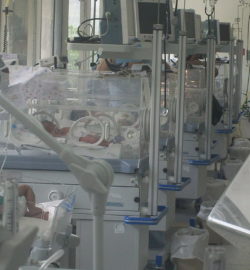
Image: Babies in NICU
It is Neonatal Intensive care Unit. All this ICU stuff might give you horrific thoughts. But the neonatal unit offers a variety of care. It is not only meant for some serious issues.
Neonatal refers to ‘New born’. A neonatal unit is a place where specialized care and treatment is given for new born babies who are preterm or have any illness during birth which might be mild or severe.
Recommended: Common health conditions treated at NICU
Who will be looking after your twins?
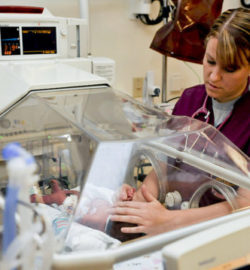
Image : NICU Staff
A neonatal unit comprises of the following people who will be involved in caring for your baby,
Nurses
There will be a group of nurses who are trained in new born child care. They will be reporting to a head nurse. It is these people who will be in close contact with your babies. They will be taking care of the daily activities of the babies like
- Feeding the baby
- Bathing
- Changing nappies
- Administering medicines
- Monitoring the working of the different body levels
- Reporting the physicians and neonatologist on the activities and condition of the baby
- Communicating to the parents on the health condition of the babies
- Explaining the parents about the given treatment
- Detailing or providing training to the parents during discharge, on the daily routines to be followed while taking care of the baby
Dedicated Pediatric Physicians
There will be a pediatric physician specialized in neonatology. There can be more than one physician and they can be working in shifts, so that the physicians presence is available in the unit round the clock. A physician’s duties will be like,
- Communicating with the consulting neonatologists / visiting physicians / surgeons and planning the course of treatment for the babies.
- Keeping a check on the babies physique at timely intervals and prepare reports about their body conditions.
- Giving instructions to the head nurse or group of nurses on the specific care/treatment to be given to each baby.
- Advising the nurses on any adverse conditions which might occur with the babies and educating them on how to handle the situation immediately and notify the physicians.
- Attending to any emergencies arising in the NICU and make the best decisions for the babies well being, by discussing with the consulting pediatrician/neonatologist.
Consulting Neonatologist
A consulting neonatologist is a pediatric physician who is mastered in new born baby care. He/She will be the primary contact of the parents whose babies are in the NICU. After discharging their babies from the hospital, the parents will have regular check-ups for their twins with this consulting neonatologist. His/Her responsibilities include the following.
- He/she will be the one who will check up your baby immediately after birth and the main adviser on the treatment to be given to the babies.
- He/she will be visiting the NICU once or twice a day and check the condition of the babies.
- He/she will also be attending to the emergencies which could not be handled by the NICU pediatric physicians.
- He/she will refer the babies to other visiting pediatric physicians or surgeons if the baby needs any specialized care or needs an additional opinion on its health from the visiting doctors.
Visiting Pediatric Physicians or Surgeons
There may be more than one visiting pediatric physician or surgeon who will be mastered in one or more specific areas, on the treatment of the new born babies. They will be called on demand to the NICU, if any opinion is needed on a baby’s health/treatment or if any surgeries have to be performed for any of the babies.
Visiting Ophthalmologist
A visiting ophthalmologist (Retina specialist) will perform an eye check-up for your new born infants especially if they are preterm. If your babies are identified with RoP (Retinopathy of Prematurity) the ophthalmologist will perform laser treatments to treat the abnormal blood vessels in the eyes of the babies.
So It is these people who will take care of your baby for quite a few days. It is better for you to keep good contact with the NICU staff and understand the activities and health conditions of your babies. Make sure that you get all the queries and doubts cleared on time. Never hesitate to ask anything to anybody regarding your twins. Its your babies, you have all the rights to know every detail about them.
Recommended : Survival guide for a NICU parent
NICU Equipment
A NICU will have the following equipment to assist in the treatment of your babies. Its good for you to know the basic functioning of these machines so that you will understand when your neonatologist is referring to them. Also it will remove the fear, when you see all these machines surrounding your babies. You would realize how important they are in your babies first few days.
Incubator
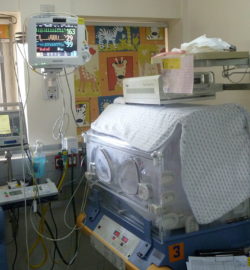
Image: Incubator
Babies who are born very small or born preterm are usually kept in the incubator. It is a small cot which provides the same comfort and environment to the babies like when they were in their mother’s womb. It will help the growth and development of the babies for the initial few days. It can regulate the temperature and humidity and make sure the babies are warm. It will supply oxygen if required, based on specific cases. Most of the incubators will be closed to keep the babies away from any bacterial/viral infections. While some of them might be open with respect to the infant’s health conditions. In many cases, the twin babies will be sharing the same incubator.
Warmer
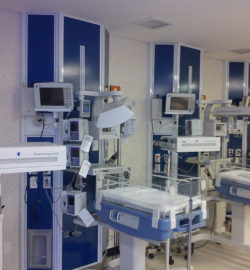
Image: Warmers
Infant warmers comprise of an overhead heating device and heated mattresses that continuously provide the needed warmth for the babies. Like incubators, the warmers also help to regulate the body temperature and provide a stable environment for the babies. It can be used in place of the incubators if the baby needs to be handled very often.
Photo therapy
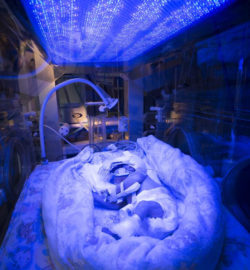
Image : Phototherapy
New born infants who are premature will be mostly diagnosed with neonatal jaundice. Neonatal jaundice is caused due to the increased levels of billirubin in the blood. This will change your babies skin color to yellow and the whites of their eyes will also turn yellow. This is treated with photo therapy lights also called as bililights. The baby will be kept under these lights for certain period, which will breakdown the billirubin and thereby help the baby to get rid of it.
Recommended : Parenting Twins
Ventilator
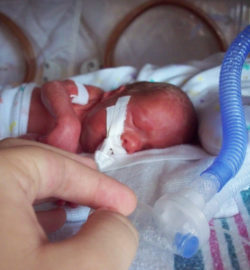
Image : Ventilator support
Ventilators help the babies to breathe. It will be connected through tubes to the baby’s windpipe through their mouth or nose. The ventilator will temporarily breathe for the babies whose lungs are still not capable to do the respiratory functions. Mostly preterm babies need the support of the ventilator.
Monitor
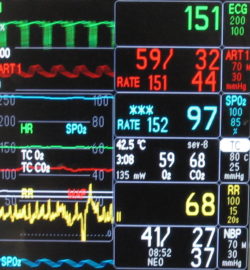
Image: Monitor
Monitors are used to displaying the various readings of your infant’s body so that the doctors can make sure everything is under control. They are used to display heart rate, breathing rate, pulse rate, body temperature etc., Accordingly, the baby will be having leads attached to its chest or pulse oximetry tapped to fingers/toes or a wire adhered to the skin of the baby.
Feeding Pumps/tubes
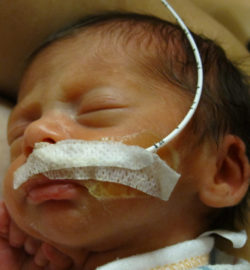
Image: Baby with a Feeding tube
If your baby cannot spend more energy in taking a feed, feeding pumps/tubes are used to reduce the pressure on the baby. Feeding tubes are attached through the baby’s nose or mouth to the stomach. Breast milk or formula is often fed through the feeding pumps/tubes.
IV catheter and Lines
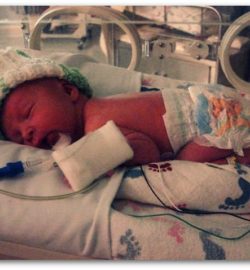
Image: Baby with IV lines
An intravenous catheter is a small needle inserted into the small veins of the baby’s hand, foot, legs or scalp. Once the needle is in place, it will be removed and a small tube will just be left with it. Whenever necessary this IVs will be used to input medications or drips or blood transfusion as required. Usually, most of the babies in the NICU will have an IV in place. If more volume of fluid need to be given, a stronger IV will be needed. This is called central line as the central veins in the chest, neck or groin will be used.
So this is what a NICU will look like. It is advisable to know all the information before hand once your babies are shifted to the NICU. This will avoid any scary thoughts and keep you calm. Let the NICU staffs care for your babies and you provide the needed support. Take this time to recover from the delivery pains and make yourself prepared to welcome the babies home.
“Babies in the NICU are determined, strong, courageous, inspirational and miracle all rolled into one.”
Image credits : Main image by Yann (talk) – Own work, GFDL, via wikimedia ; Babies in NICU by Bobjgalindo – Own work, GFDL, via wikimedia ; NICU staff by Official U.S. Navy Imagery via Visual hunt ; Incubator by deror_avi – Own work, CC BY-SA 3.0, via wikimedia ; Warmers by Genaro1719 – Own work, CC BY-SA 4.0, via wikimedia ; Phototherapy by Fototerapia via photopin (license) ; Ventilator support by ceejayoz, CC BY 2.0, via wikimedia ; Monitor by hudsonthego via DIYlovin / CC BY ; Baby with a Feeding Tube by bradleyolin via Flickr ; Baby with IV lines by downing.amanda via Flickr ;


